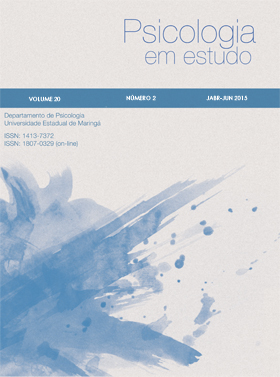HISTÓRIA, SUBJETIVIDADE E ARQUIVOS EM MICHEL FOUCAULT, PAUL VEYNE E GILLES DELEUZE
Résumé
O artigo apresenta algumas ferramentas para a realização da história por meio da arqueologia, da genealogia e da cartografia com Foucault, Deleuze e Veyne. O trabalho com documentos e arquivos, na perspectiva da história da produção da subjetividade, é relevante para as pesquisas em Psicologia. O texto visa, com efeito, propor procedimentos gerais sobre os estudos históricos e apontar algumas recomendações aos que desejam manejar fontes, presentes em arquivos públicos e privados. A escrita histórica perpassa conceitos importantes para a crítica à naturalização de práticas sociais e, assim, permite operar espaços de liberdade onde pareciam existir evidências. Foucault foi nomeado, por isso, de destruidor de evidências porque delineava marteladas, a partir de Nietzsche, das camadas petrificadas dos saberes, poderes e subjetividades, os quais compõem dispositivos de governo das condutas, no presente. Assim, é possível analisar historicamente os acontecimentos em jogo, em um campo móvel e de forças heterogêneas. A história da verdade é uma problematização, a qual possibilita desnaturalizar os saberes, mover poderes e deslocar subjetividades. Historicizar é criar fissuras e espaços outros.
Téléchargements
Références
Alvarez, M. C. (1999). Michel Foucault e a ordem do discurso. Em A. M. Catani & P. Martinez. (Orgs.) Sete ensaios sobre o Collège de France. São Paulo: Cortez.
Albuquerque Jr., D. M. (2010). Discursos e pronunciamentos: a dimensão retórica da historiografia. In: Pinsky, C. B. & Luca, T. R. (Orgas.). O historiador e suas fontes. (pp. 203-25). São Paulo: Contexto.
Artières, P. (1988). “Arquivar a própria vida”. In: Estudos Históricos. Rio de Janeiro: FGV, (21).
Artières, P. (2014). Les trouvailles de l’archéologue. In: Bert, J-F. & Lamy, J. Michel Foucault. Un heritage critique. (pp. 89-96). Paris: CNRS editions.
Cardoso JR., H. R. (2001). Tramas de clio: convivências entre filosofia e história. Curitiba: Aos quatro ventos.
Castro, C. (2008). Pesquisando em Arquivos. Rio de Janeiro: Jorge Zahar Ed.
Cunha, M. T. (2009). Diários pessoais: territórios abertos para a história. In: Pinsky, C. B. & Luca, T. R. de (Orgas.). O historiador e suas fontes. (pp. 251-280). São Paulo: Contexto.
Deleuze, G. (1992). Conversações. Rio de Janeiro: Editora 34.
Deleuze, G. (2004). Diálogos. Porto: Relógio D’Água.
Deleuze, G. (2005). Foucault. São Paulo: Brasiliense.
Deleuze, G. & Guattari, F. (2013). Mil platôs I: capitalismo e esquizofrenia. Rio de Janeiro: Editora 34, 1996.
Deleuze, G. & Guattari, F. (2014). Kafka. Por uma literatura menor. Belo Horizonte: Autêntica.
Farge, A. (2009). O sabor do arquivo. São Paulo: EDUSP.
Farge, A. (2011). Lugares para a história. Rio de Janeiro: Autêntica.
Foucault, M. (1999a). Vigiar e Punir: a história da violência nas prisões. (19a. ed.) Petrópolis: Vozes.
Foucault, M. (1999b). Em defesa da sociedade. Curso no Collège de France (1975-1976). (3a. ed.). São Paulo: Martins Fontes.
Foucault, M. (2008a). Segurança, território e população. São Paulo: Martins Fontes.
Foucault, M. (2008b). Nascimento da biopolítica. São Paulo: Martins Fontes.
Foucault, M. (2010). O governo de si e dos outros: curso no Collège de France (1982-1983). São Paulo: Martins Fontes.
Gil, A. C. (2008). Métodos e técnicas de pesquisa social. São Paulo: Atlas.
Gros, F. (2014). Problématisation. In: Bert, J-F & Lamy, J. Michel Foucault. Un heritage critique. (pp. 125-126). Paris: CNRS editions.
Gros, F. (2006). “O cuidado de si em Michel Foucault”. In: Rago, M. & Veiga- Neto, A. (orgs.). Figuras de Foucault. Belo Horizonte: Autêntica, p. 127‐138.
Lemos, F. C. S. & Cardoso Jr, H. R. (2009). A Genealogia em Foucault: Uma Trajetória. Psicologia e Sociedade, vol. 21 (3): pp. 353-357.
Rabinow, P. & Rose, N. (2003). The essential Foucault. New York: The Word Press.
Reis, J. C. (2014). História & teoria. Historicismo, Modernidade, Temporalidade e Verdade. Rio de Janeiro: Editora FGV.
Sforzini, A. (2014). Michel Foucault. Une pensée du corps. Paris: Presses Universitaires de France.
Veyne, P. (1979). O inventário das diferenças. História e Sociologia. São Paulo: Brasiliense.
Veyne, P. (1998). Como se escreve a história. Brasília: Editora UNB.
As opiniões emitidas, são de exclusiva responsabilidade do(s) autor(es). Ao submeterem o manuscrito ao Conselho Editorial de Psicologia em Estudo, o(s) autor(es) assume(m) a responsabilidade de não ter previamente publicado ou submetido o mesmo manuscrito por outro periódico. Em caso de autoria múltipla, o manuscrito deve vir acompanhado de autorização assinada por todos os autores. Artigos aceitos para publicação passam a ser propriedade da revista, podendo ser remixados e reaproveitados conforme prevê a licença Creative Commons CC-BY.
The opinions expressed are the sole responsibility of the author (s). When submitting the manuscript to the Editorial Board of Study Psychology, the author (s) assumes responsibility for not having previously published or submitted the same manuscript by another journal. In case of multiple authorship, the manuscript must be accompanied by an authorization signed by all authors. Articles accepted for publication become the property of the journal, and can be remixed and reused as provided for in theby a license Creative Commons CC-BY.
















